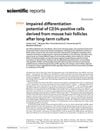321 citations,
January 2012 in “Cell stem cell” TGF-β2 helps activate hair follicle stem cells by counteracting BMP signals.
 101 citations,
March 2019 in “Cell Stem Cell”
101 citations,
March 2019 in “Cell Stem Cell” Certain immune cells in the skin release a protein that stops hair growth by keeping hair stem cells inactive.
41 citations,
April 2019 in “PLOS genetics” CD34+ and CD34- melanocyte stem cells have different regenerative abilities.
2 citations,
June 2022 in “International Journal of Molecular Sciences” Lower levels of certain genes in hair cells improve hair loss treatment outcomes.
64 citations,
January 2013 in “The journal of investigative dermatology/Journal of investigative dermatology” Human stem cells can help form hair follicles in mice.
 August 2024 in “Receptors”
August 2024 in “Receptors” Vitamin D receptor is crucial for skin wound healing.
 43 citations,
August 2018 in “Cell Stem Cell”
43 citations,
August 2018 in “Cell Stem Cell” Hoxc genes control hair growth through Wnt signaling.
 1 citations,
September 2022 in “The journal of investigative dermatology/Journal of investigative dermatology”
1 citations,
September 2022 in “The journal of investigative dermatology/Journal of investigative dermatology” MicroRNA-148a is crucial for maintaining healthy skin and hair growth by affecting stem cell functions.
 211 citations,
May 2018 in “Trends in cell biology”
211 citations,
May 2018 in “Trends in cell biology” Different types of skin cells play specific roles in development, healing, and cancer.
 75 citations,
September 2017 in “Developmental biology”
75 citations,
September 2017 in “Developmental biology” The circadian clock influences the behavior and regeneration of stem cells in the body.
 2 citations,
June 2022 in “Scientific reports”
2 citations,
June 2022 in “Scientific reports” Mouse hair follicle stem cells lose their ability to change into different cell types after being grown for a long time.
 2 citations,
December 2016 in “Experimental cell research”
2 citations,
December 2016 in “Experimental cell research” The research found a way to identify and study skin cells with stem cell traits, revealing they behave differently in culture and questioning current stemness assessment methods.
1 citations,
January 2024 in “International journal of molecular sciences” The research identifies genes linked to wool quality in sheep and provides insights to improve wool production.

Stem cells regenerate tissues and their behavior varies by environment, suggesting the hematopoietic system model may need revision.

Skin stem cells are crucial for maintaining and repairing skin, with potential for treating skin disorders and improving wound healing.
 57 citations,
January 2014 in “Cold Spring Harbor Perspectives in Medicine”
57 citations,
January 2014 in “Cold Spring Harbor Perspectives in Medicine” Skin stem cells maintain and repair the outer layer of skin, with some types being essential for healing wounds.
 6 citations,
October 2022 in “Journal of cell science”
6 citations,
October 2022 in “Journal of cell science” Keratin genes change gradually during skin cell development and should be used carefully as biomarkers.
33 citations,
October 2013 in “PloS one” Human sweat glands have a type of stem cell that can grow well and turn into different cell types.
 1 citations,
July 2023 in “International Journal of Molecular Sciences”
1 citations,
July 2023 in “International Journal of Molecular Sciences” Treating fat stem cells with low oxygen boosts hair growth cell growth through specific signaling pathways.
 160 citations,
January 2017 in “Development”
160 citations,
January 2017 in “Development” Blood vessels and specific genes help turn cartilage into bone when bones heal.
 242 citations,
February 2016 in “Science”
242 citations,
February 2016 in “Science” Hair loss and aging are caused by the breakdown of a key protein in hair stem cells.
 8 citations,
June 2021 in “International Journal of Molecular Sciences”
8 citations,
June 2021 in “International Journal of Molecular Sciences” Exosomes from umbilical cord cells fix hearing loss and damaged ear hair cells in mice.
 291 citations,
April 2010 in “Gastroenterology”
291 citations,
April 2010 in “Gastroenterology” Certain proteins, Lgr5 and Lgr6, are important markers of adult stem cells and are involved in tissue repair and cancer development.
 25 citations,
July 2016 in “The journal of investigative dermatology/Journal of investigative dermatology”
25 citations,
July 2016 in “The journal of investigative dermatology/Journal of investigative dermatology” Imiquimod cream activates hair follicle stem cells and causes early hair growth by changing immune cells and certain protein expressions.
November 2022 in “Annals of Translational Medicine” Immune activities and specific genes are important in male pattern baldness.
 1160 citations,
November 2018 in “Physiological Reviews”
1160 citations,
November 2018 in “Physiological Reviews” The document concludes that better targeted treatments are needed for wound healing, and single-cell technologies may improve cell-based therapies.
949 citations,
January 2001 in “Cell” Adult mouse skin contains stem cells that can create new hair, skin, and oil glands.
 118 citations,
January 2016 in “Current Topics in Developmental Biology”
118 citations,
January 2016 in “Current Topics in Developmental Biology” The document concludes that while significant progress has been made in understanding skin biology and stem cells, more research is needed to fully understand their interactions with their environment.
23 citations,
May 2019 in “Stem cell research & therapy” iPSC-derived stem cells on a special membrane can help repair full-thickness skin defects.
 8 citations,
May 2021 in “Bioengineering & translational medicine”
8 citations,
May 2021 in “Bioengineering & translational medicine” Hair growth environment recreated with challenges; stem cells make successful skin organoids.




















